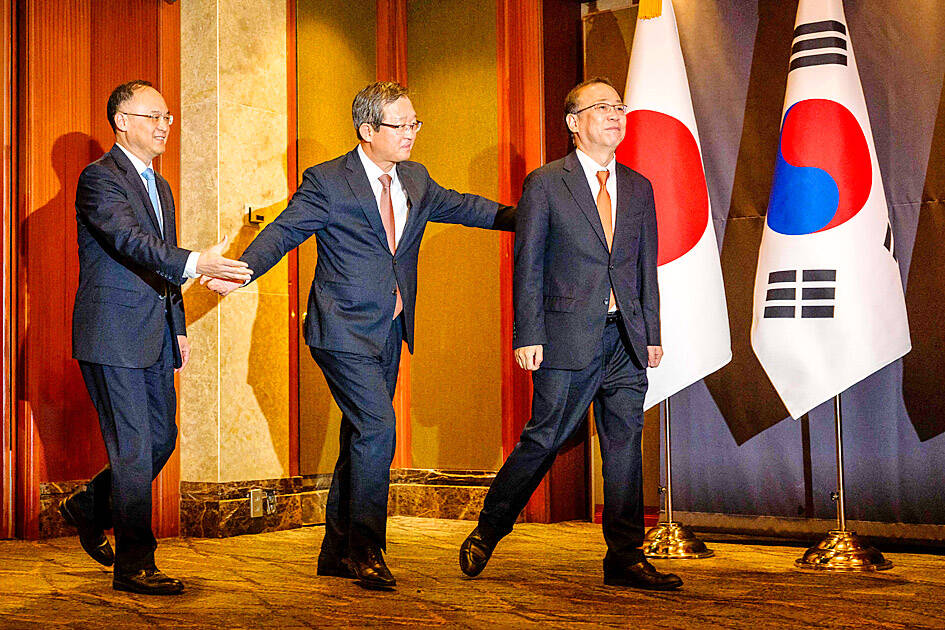Senior diplomats from South Korea, China and Japan yesterday agreed that their nations’ leaders would meet at the “earliest convenient time,” the South Korean Ministry of Foreign Affairs said after a rare meeting aimed at commencing trilateral exchanges.
The three nations had agreed to hold a summit every year starting in 2008 to foster regional cooperation, but that initiative has been frayed by bilateral feuds and the COVID-19 pandemic. The last summit was in 2019.
The ministry said in a statement that specific dates remained under discussion and that the nations’ foreign ministers would meet “in a couple of months.”

Photo: AFP
South Korea is this year’s host for three-way meetings and has proposed a summit in late December, Japanese broadcaster TBS reported.
Japanese Minister of Foreign Affairs Yoko Kamikawa said the three nations share the need to restart high-level talks, including summits, “as soon as possible.”
“I believe it is very valuable to discuss the various challenges the region faces,” she told a news conference in Tokyo.
The latest meeting was seen as partly intended to assuage Beijing’s concerns over the two US allies’ tightening cooperation after Seoul and Tokyo agreed this year to end legal, diplomatic and trade disputes over issues dating to Japan’s 1910 to 1945 occupation of Korea.
“We unanimously believe that carrying out cooperation is in the common interests of the three parties,” Chinese Ministry of Foreign Affairs spokesman Wang Wenbin (汪文斌) said yesterday. “We should work together to strengthen practical cooperation ... and make new contributions to regional peace, stability and prosperity.”
South Korean President Yoon Suk-yeol and Japanese Prime Minister Fumio Kishida have taken steps to mend ties and last month held a historic trilateral summit with US President Joe Biden, where the three vowed to boost cooperation, including on defense and economic security.
A senior South Korean official said China has been proactive in seeking trilateral cooperation and arranging meetings since bilateral ties soured over the deployment in 2017 of a US Terminal High Altitude Area Defense (THAAD) anti-missile system in South Korea.
“I’m sure there should be some discomfort on their side regarding our increasingly close trilateral security partnerships with the United States and Japan,” the official said, speaking on condition of anonymity because of the sensitivity of the situation. “There seems to be a view there that they need to properly manage bilateral ties with us, as they saw how their THAAD responses backfired and fueled anti-China sentiment to serious levels.”
Beijing would most likely look to leverage trilateral trade ties to counterbalance the US friend-shoring strategy, promote people-to-people exchanges, and enhance communication and dialogue with Seoul and Tokyo on security and defense matters, said Zhao Tong (趙通), senior fellow at the US-based Carnegie Endowment for International Peace.
Japan and South Korea have an interest in avoiding conflicts and maintaining a stable security relationship with China, he said.
“These shared interests open up new avenues for strategic communication, confidence-building and measures to prevent crises,” Zhao said.

AIR SUPPORT: The Ministry of National Defense thanked the US for the delivery, adding that it was an indicator of the White House’s commitment to the Taiwan Relations Act Deputy Minister of National Defense Po Horng-huei (柏鴻輝) and Representative to the US Alexander Yui on Friday attended a delivery ceremony for the first of Taiwan’s long-awaited 66 F-16C/D Block 70 jets at a Lockheed Martin Corp factory in Greenville, South Carolina. “We are so proud to be the global home of the F-16 and to support Taiwan’s air defense capabilities,” US Representative William Timmons wrote on X, alongside a photograph of Taiwanese and US officials at the event. The F-16C/D Block 70 jets Taiwan ordered have the same capabilities as aircraft that had been upgraded to F-16Vs. The batch of Lockheed Martin

GRIDLOCK: The National Fire Agency’s Special Search and Rescue team is on standby to travel to the countries to help out with the rescue effort A powerful earthquake rocked Myanmar and neighboring Thailand yesterday, killing at least three people in Bangkok and burying dozens when a high-rise building under construction collapsed. Footage shared on social media from Myanmar’s second-largest city showed widespread destruction, raising fears that many were trapped under the rubble or killed. The magnitude 7.7 earthquake, with an epicenter near Mandalay in Myanmar, struck at midday and was followed by a strong magnitude 6.4 aftershock. The extent of death, injury and destruction — especially in Myanmar, which is embroiled in a civil war and where information is tightly controlled at the best of times —

Taiwan was ranked the fourth-safest country in the world with a score of 82.9, trailing only Andorra, the United Arab Emirates and Qatar in Numbeo’s Safety Index by Country report. Taiwan’s score improved by 0.1 points compared with last year’s mid-year report, which had Taiwan fourth with a score of 82.8. However, both scores were lower than in last year’s first review, when Taiwan scored 83.3, and are a long way from when Taiwan was named the second-safest country in the world in 2021, scoring 84.8. Taiwan ranked higher than Singapore in ninth with a score of 77.4 and Japan in 10th with

SECURITY RISK: If there is a conflict between China and Taiwan, ‘there would likely be significant consequences to global economic and security interests,’ it said China remains the top military and cyber threat to the US and continues to make progress on capabilities to seize Taiwan, a report by US intelligence agencies said on Tuesday. The report provides an overview of the “collective insights” of top US intelligence agencies about the security threats to the US posed by foreign nations and criminal organizations. In its Annual Threat Assessment, the agencies divided threats facing the US into two broad categories, “nonstate transnational criminals and terrorists” and “major state actors,” with China, Russia, Iran and North Korea named. Of those countries, “China presents the most comprehensive and robust military threat